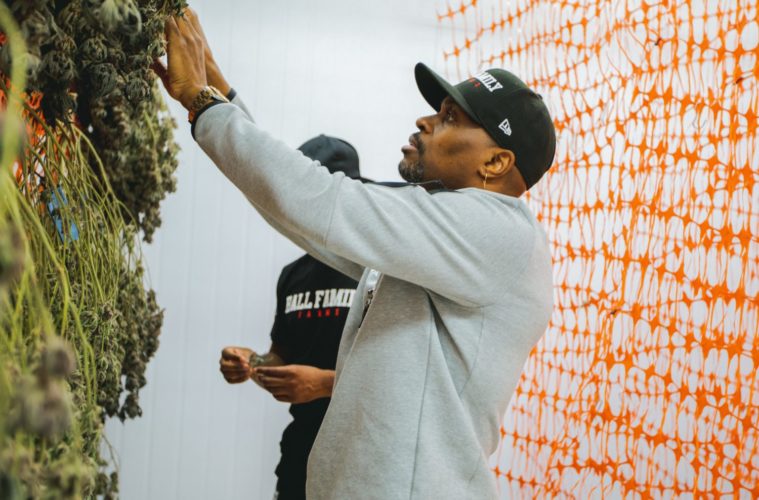We recently caught up with L.A.’s original social equity farm Ball Family Farms [BFF].
When we last chatted with its founder Chris Ball, he was already one of the shining scenarios of what might be possible for equity operators. The former pro football player spent five years flipping Canadian packs in L.A. until 2010 when a new associate got him caught up. Ball was originally looking at a decade in prison but ended up taking a plea bargain for a 30-month bid. After all the other cases played out, the judge would eventually sentence him to time served. A few weeks later he kicked on the power in a 14-light grow.
He would combine all of his experiences into becoming L.A.’s first social equity farm.
“Everything is going good,” Ball told L.A. Weekly. “The market is a bit down right now which was to be expected.”

Chris Ball
As Ball watched more and more faces jump in on the production side of things, he knew the flood would drop prices.
“We kind of lowered our pricing here and there just to compete and deal with this surplus of products around the state, just strategizing with our sales division,” Ball said. “I kind of feel like we have graduated to a different level, so to speak. I would say we were playing college ball. Now we are in the pros for sure.”
As for the pandemic? It’s gone great for BFF. Weed was declared essential early and everyone was stuck home to smoke it. And by the time the world closed, their facility was already dialed in, so the farm was on a steady footing as things started to get crazy. The facility is 240 flowering lights with another 40 in the veg area.
Ball has 20 lights hunting down unique new flavors all the time. “We’re doing that all year round. That never stopped,” he said.
The diverse lineup is exactly one of the things that helped BFF crush over the last 24 months in a sea of dessert weed and OG. Currently, he has four strains in full production with a fifth on the way. He’s just not sure which direction he’s going to go with but assures all its heat.
“Our business skyrocketed in the pandemic,” Ball said. “It wasn’t very hard to navigate that besides trying to keep up with the demand. That demand was our biggest hurdle. And then, keep our staff and workers from catching COVID.”
While much of the cultivation aspect of things is built out, BFF has plenty of room to expand. For years they operated on the top floor of their building as the company continued to grow. Ball recently got the keys to downstairs where he will build out BFF’s onsite packaging, distribution and solventless extraction facilities.
We asked Ball how key it is for survival moving forward to have a vertically integrated company that can grow, manufacture and distribute weed to his dispensary partners?
“Extremely key, because you know where the market is right now. You got people going out of business,” Ball said. “I’m seeing a bunch of distros go out of business. The distros that are still making it I’m seeing them change their business, their business plan, because they just can’t sustain and survive. So for us, being vertically integrated and keeping everything in house, it comes in clutch because you know we distribute our own products so we’re not paying 16% or 17% to go to the store with our product.”
Ball said as soon as construction is done downstairs he’ll be saving another $1.70 a unit. And through his partner Ebony Andersen’s work at Josephine and Billie’s, the farm has direct access to retail and delivery. That’s huge.
Finally, we asked Ball if he’s surprised there aren’t more social equity success stories to emerge from the program. Even if not everyone has the resources of a former pro athlete, more winners were expected.
“It’s not surprising at all,” Ball emphasized. “It’s actually right on par with what we talked about a year or two ago. What I knew was going to happen, right? Just from going through it. The reason why I knew they weren’t going to be more success stories was because of what I had to go through to get there. And I knew what I had wasn’t what everyone else had.”
Ball said back then he couldn’t have told you 1,000% for sure, but he didn’t think there was going to be many guys in the position he is in now.
“It’s actually disappointing that the city and the state haven’t figured this out yet,” Ball said. “There could be more success stories, more Ball Family Farms, more Chris Balls. But again, our social equity program remains broken. And until the city and the state figure out how to get the proper resources to these applicants it’s gonna stay that way.”
Advertising disclosure: We may receive compensation for some of the links in our stories. Thank you for supporting LA Weekly and our advertisers.

